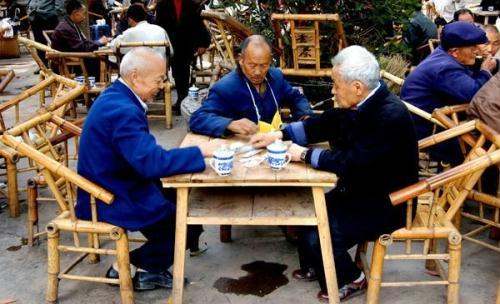
Chengdu tea houses (Source: www.sc.gov.cn)
Tea houses, one of Chengdu’s features, are traditional places that give the most expression to Chengdu’s leisurely pace of life. Going to tea houses is the hobby of the Chengdu people. There, you can taste strong flavor of the old Chengdu: bamboo chairs, 3-piece tea sets (tea trays, porcelain tea bowls and lids), and “tea doctors” who hold dozens of tea sets on their palms at swift pace and tilt up tea pot spouts when adding tea for customers. Tea houses are also important places for people’s communication and entertainment.
Tea drinkers go to tea houses for chatting, business talks or friends get-togethers. Some customs such as Sichuan opera performance and ear-picking are still popular in tea houses. Many tea houses are frequented by Sichuan opera lovers who meet and practice the opera there. Heming Tea Shop in the People’s Park and Jinjiang Juchang Tea Shop are among the typical tea houses in Chengdu.
There has been an old saying in China that Sichuan has the largest tea house in China, while Chengdu has the largest tea house in Sichuan. The largest tea houses in the old Chengdu had three or four halls and courts and could accommodate more than one thousand customers. That was indeed a magnificent scene.
The Chengdu people love drinking tea. Both the prevalence of and their indulgence in tea-drinking surpass that of the neighboring province Yunan, world famous for tea-producing. A cup of light tea after getting up in the morning helps the Chengdu people clear their lungs and moisturize their throats; a cup of light tea after dinner is good for promoting digestion and getting rid of fatness; after diligent work, a cup of light tea is surely a perfect dose for eliminating tiredness and refreshing yourselves; a cup of light tea is a good listener to close friends’ unrestrained talks; again a cup of light tea proves to be a competent mediator for clearing up disputes between relatives and neighbors.
